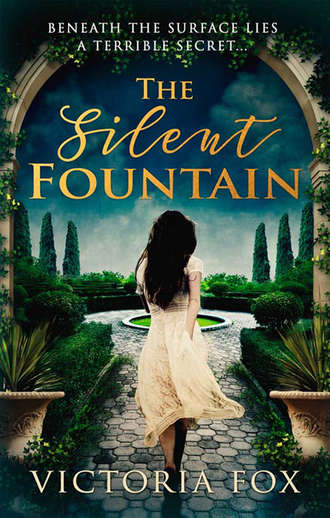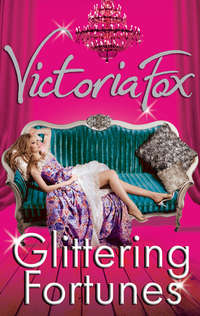
Полная версия
The Silent Fountain
‘Of course.’
‘Discretion is everything,’ says Adalina. ‘Now, come, I will show you the rest of the house, but be aware it will take time to familiarise yourself. We have just two rules. One,’ she says, gesturing to a closed door, leading, I surmise, to that part of the mansion I saw was covered in strangling vines, ‘the west wing is out of bounds. Two, so is the top floor. I will show you when we get there. It will not be hard for you to obey these rules – those parts are always locked so you will know if you trespass.’
Trespass. The word conjures Biblical transgression. Sin. Forbidden fruit.
I think of him.
‘This way, Lucy.’
Adalina leads me through the hall.
We embark up a grand staircase, burned-amber sandstone with an ornate banister, where we pass a series of portraits. ‘Who’s that?’ I ask, forgetting Adalina’s warning, transfixed as I am by the image of a man wearing a red blazer. One of his eyes is black and the other is green. He is standing against an emerald forest and the light of mischief dances in his stare, a light so convincingly caught on the canvas that I’m certain in the real world he is dead. Adalina watches me sideways.
‘We are in the process of covering these up,’ she says carefully, and beyond I spy several further frames draped in dustsheets. Reluctant, I follow her. Off the first landing, she shows me a series of bedrooms, unused but all the same needing care. One houses two rows of wooden sleigh beds, hospital-like, intended for children.
‘It was a sanatorium, last century,’ explains Adalina, a little too quickly.
The first thing I’ll do is air the rooms, I think, making a note of tasks I can begin in the morning. I’ve decided quickly that this is not a place in which I can allow myself to grow idle – partly because that road leads to him, and partly because I’m already resisting temptation to tease open drawers, to explore inside cabinets, to force rusted locks… to fling pale shrouds off portraits and read the names beneath.
The upper three floors are the same. There’s an old library, books caked in powder with spines cracked, and a mezzanine looking out over the garden. I want to climb up but Adalina tells me the steps are dangerous. ‘They haven’t been used in years.’ There are dressing rooms, reading rooms, water closets; pantries, larders and butteries; boudoirs and cabinets, storerooms, undercrofts and cellars; spaces left empty and who knows what they were once used for. The whole impression is one of a labyrinth, winding and never-ending, deliberately confusing where one space resonates almost exactly another. If I were alone, I’d already be lost.
We come to a door at the end of a corridor, and stop.
‘This leads to the attic,’ I say, and take the wooden handle in my palm, as if I’m testing it, as if Adalina might be wrong and it will swing open unaided. It doesn’t.
‘Nobody goes,’ confirms Adalina, and I understand this is the out-of-bounds top floor. ‘Your work extends to this point,’ she says, ‘and not beyond.’
I take my hand away.
‘I tell you this because of the girl we let go before you,’ says Adalina. ‘She did not heed my advice and Signora had no choice but to dismiss her.’
‘Will I meet her?’ I ask, and it hits me then that no one has told me her name. She. Her. Signora. The woman of the house…
‘Soon.’ Adalina’s gaze flits away. ‘For now I will show you your quarters.’
*
The Lilac Room, as it turns out, isn’t lilac at all. It is painted cream, with high, corniced ceilings and a four-poster bed swathed in thick red fabric. Crudely painted olive trees adorn one wall, just above the skirting, drawn, I’d wager, by a child.
Adalina wasn’t lying when she described this as my quarters, for, like the rest of the Barbarossa, it’s extensive. There is an adjoining bathroom, a little rundown but I’m not about to complain (I don’t relish the thought of getting lost out there in the middle of the night in pursuit of the loo), a writing desk, a couple of armchairs by a handsome fireplace (a peep up the flue tells me it’s long been blocked) and a mahogany wardrobe several times the size of the one Bill and I share back in London. Below the window, whose panes reach to twice my height, is an embroidered chaise.
Alone now, I can appreciate the full spread of the estate. Once upon a time the lawns would have been neatly landscaped, descending in tiers separated by stone to a pink- and peach-strewn rose garden, but the steps now leak into each other, the walls peeling and draped in vines, the grass overgrown. Beyond the roses, light catches on glass, where an old greenhouse is bursting with plants, and etched into a screen of brick I detect the subtle outline of a door. It reminds me of a book I read as a child, or maybe Mum read it to me, because the memory is accompanied by the mellow tang of cloves, but then I realise the window is ajar and it could just as easily be the cluster of herbs whose scent swims in on the breeze. I want to step outside and go towards that door and turn the rusted key. You will know if you trespass.
Further still, the lemon groves and the track I came in on, and, to the west, where the sun is gently setting and flooding the sky with orange and gold, there is a pergola, majestic on its mound of grass, as perfect as the curve on a paperweight. Against the bloodshot sky, twin swifts dip and dive their dusk-hour acrobatics.
There is one thing I’m omitting from this view, the thing I came past earlier and that I’m reluctant even now to acknowledge. The fountain by the entrance, set amid a dozen cypress trees, appears gloomier now the sun has fallen. I don’t know why it’s such a horrible thing. The protruding shape I detected earlier is an ugly stone fish, eyes bloated, scales crusted, its open mouth gasping air, fossilised mid-leap as if cast under a terrible spell. The trees don’t help either, standing guard, their spears raised – and perhaps that’s all it is, the notion that there is something cosseted within that requires protection, something beyond the decaying stone and stagnant water…
I turn away and fumble in my bag for my phone. There is a message from Bill, asking if I got here OK, but I must have picked it up in the city and then gone out of signal, for there’s no reception here at all. The thought of asking after Wi-Fi is anachronistic. Back at home, I’d have panicked at being off radar, but here it seems natural. Nobody except Bill knows where I am. Nobody can find me. I think of the bomb waiting to detonate in London – Natasha triumphantly handing my name to whoever’s interested, whoever wants to destroy it – and it seems impossibly far away.
Only when I lie on the bed and close my eyes does it occur to me that no contact means no him. What if he needs me? What if he has to get in touch, and can’t? I reassure myself with a plan to get connected in the city: soon, soon.
In the meantime, there is a pinch of pleasure in the thought, however unlikely, that he might be trying to reach me, that he might be the one seeking me out, instead of my repeatedly glimpsing a screen that gives me nothing. For once, I’m unavailable.
I’m gone. Nobody can catch me.
In minutes, I’m asleep.
CHAPTER SIX
‘Vivien?’
The maid knocks gently then steps inside. It’s rare that Adalina addresses her by her name, and Vivien knows it is because they are about to share a confidence.
‘What is she like?’ Vivien asks. It isn’t what she really wants to ask, but she cannot ask that yet. It will seem too desperate, too close to the bone.
‘As we expected,’ says Adalina. ‘She’ll be fine.’
‘You told her…?’ Vivien glances away. ‘How much did you tell her?’
‘I told her nothing.’
Vivien exhales. Adalina lays down a supper tray, soup and crackers, a bunch of grapes the colour of bruises, but she has no appetite.
‘Are you all right, signora?’
‘I saw her from the window,’ Vivien says, daring to meet Adalina’s eye, wanting to know if the maid has seen it too. But Adalina gives nothing away.
‘Do you think she looks like…?’ Vivien swallows. She cannot say the name. ‘I saw her and I thought what a remarkable resemblance she has to—’
‘She’s dark. That is where it ends,’ says Adalina.
‘But her height, her build, everything – it’s everything.’
‘Not at all.’ Adalina protests, unwilling to give her charge any scope for indulgence. Vivien notices this, and seizes it as proof of her agreement.
‘You can’t deny it.’
‘I can. Up close she is entirely different.’
‘It was like seeing her again.’ The ‘her’ is spat like venom. It’s been years – years – but the poison remains. She cannot get her mouth around it, the taste bitter, too horrible, too immediate, all that hate multiplying inside her with nowhere to go.
‘Then you must meet the girl,’ says Adalina. ‘I will arrange it.’
‘I cannot have her living here if you are wrong.’ Vivien is trembling, her voice skittish, her heart leaden. Get control of yourself, she thinks, aware the resemblance the girl has is impossible, a trick of her mind, but the uncanny is all around, in the windows, in the water, in shadows and reflections, and she would not put it past the house to test her in this way. Vivien has heard the noises late at night, the creak of a floorboard, the slam of a door, the howl of the wind so like a woman’s scream…
‘You must eat,’ says Adalina. The pills come out, the tray set down.
Without warning, Vivien takes her hand. Adalina is surprised.
‘It isn’t her, is it?’ she asks in a strange, disembodied voice.
‘Of course not, signora.’
‘That would be impossible.’
‘Absolutely.’
‘She wouldn’t come back for me, would she?’
Adalina is frightened now.
‘Never,’ she rasps.
‘She wouldn’t dare.’
‘No, she wouldn’t dare.’
Vivien releases her grasp. Adalina fills a water glass, as if nothing has happened. Sometimes, the maid stays to help with supper. Tonight, she leaves.
CHAPTER SEVEN
Vivien, Los Angeles, 1976
In years to come, Vivien Lockhart would look back on the night that her world began: on the point at which her journey was set. Four years since she had run from home, four years of surviving on luck and a dime – until the stars joined up their fatal alignment and the wide, brave future gathered her to its beating chest.
In a velvet-swathed dressing room at Boudoir Lalique, Vivien perfected a final swipe of mascara before sitting back to appraise her reflection. Wide blue eyes lined with dashing kohl; full, crimson lips; and her sleek blonde hair tied beneath a majestic scarlet turban, studded with rubies. Each time the vision was surprising – this person was a girl and a woman, herself and a stranger. Jewels glimmered at her forehead, and the neck of her opulent Biba robe, reminiscent of the one Farrah Fawcett wore to that premiere on Broadway at the weekend, made her appear like the head of a powerful sphinx. At Boudoir Lalique, she was no longer Vivien. She was Cleopatra.
‘You’re up, hon,’ said one of the girls, wafting into the dressing room in a mist of knockoff Chanel. ‘There’s a new guy out there tonight – he’s smokin’.’
Vivien stood, swallowed a knot of fear that she would be assigned this fresh patron. It made no difference if he was handsome or not: she was still at his mercy.
‘Thanks,’ she answered, watching as the girl grabbed her bag and hooked up with the others at the door, giggling and shrugging their coats on. Vivien had this idea of friendship among women, a caramel-hued roller-skate ride through buttered popcorn and candyfloss and hairspray, and they had asked her before to join them, tried to include her, but she always said no. She was scared of them, their breezy confidence and happy conversation, their cola bubblegum and easy swear words, so far removed from the dark, punitive annals of her own past. She’d love to have a friendship like that but she didn’t know how. She didn’t know how to dismantle the fortress she’d built, knowing its every limit and parameter, instructing herself to stay inside.
Vivien took a breath and stepped through the swathe of fabric on to the dance floor. The heat hit her instantly: of bodies, of liquor, of thick, glowing cigars… of wealth. All eyes were on her as she moved across the room, as lithe as a panther.
The Lalique wasn’t any old discotheque. Whereas others in town were as light as Cinzano, this was as syrupy and dark as the throat-searing brandy it served in diamond-cut tumblers behind the bar. Lavish, smoky, sexy, and strictly private, it oozed decadence. Men clustered in leather booths, some lone wolves, some prowling in packs. Vivien could smell the dollar bills that came through the doors, and wished each night that the cash would whisk her away, an ocean of it on which to cast her sailboat, taking her to the life she’d always longed for. Until then, she would close her heart and soul to the men who took her backstage, just as she had closed her heart and soul to her father. What choice did she have? She was never going back.
‘Hey, baby…’
‘Lookin’ good, honey…’
‘You wanna come sit with me for a while?’
Murmurs of approval and invitation followed her through the sultry space. Chin up, smile on, Vivien poured cognac and champagne and absinthe, prepared perfect squares of glass with their neat lines of cocaine, and sat with her company for the night, a group of Japanese businessmen. Quickly she ascertained the one in charge, the one who would have paid, and made sure to compliment him on his suit, his tie, his expensive cologne. The drunker the group became, the more freely their hands roamed. Vivien remembered the first time a client had touched her leg: the feel of his thumbs, pressing, pressing, first on her knee and then on her thigh, higher and higher still, hot and dry. She had frozen, but the club kept turning, the drinks kept flowing, and this was how it was.
‘Is there somewhere we can go?’ the chief asked now, his eyes red-rimmed. Vivien judged he had twenty minutes before he passed out.
When she had arrived at the Lalique two years ago, wide-eyed and hopeful, she had taken the job of hostess, welcoming parties, pouring drinks, looking pretty, draped against the glass-topped bar smoking one of her impossibly long silver-tipped cigarettes while David Bowie’s ‘Fame’ twanged its bass – at least that was how Mickey, the owner, had sold it. For a while she had enjoyed being Cleopatra, her alter ego, relishing the chance to run from the child she’d been in Claremont, spritzing perfumes, donning costumes, collecting her tips in a plush satin pouch at the end of the night. But then her job description changed. It started with the odd grope, the occasional leer, and then it was no longer enough to laugh at their jokes or let them squeeze her hand. ‘You gotta do what you gotta do,’ said Mickey, which was less advice than instruction. Each time one of her clients led her into the back, she drove out her dread and did her duty. She blocked out the rest.
‘Sure,’ Vivien told him. ‘Another drink first?’
‘You’re gonna lead me astray…’ he slurred.
She was about to respond when a figure caught her eye. A man was standing in her peripheral, alone and all the more brazen for that solitude.
His appearance threw her. Conversation dried on her lips – but luckily her companion was too trashed to notice. The stranger was handsome, fair, tall, but it was the way he was looking at her that stole her breath. There’s a new guy out there tonight – he’s smokin’. This man radiated power. He radiated money.
Vivien tried to look away, but each time she was pulled back. He was magnetic. She grappled for words, offered liquor to her clients and realised as she did that her hands were shaking, and still the man neither moved nor averted his gaze. He had to be the only sober one in the room. She felt his scrutiny scorch into her, but not in the usual lecherous way. He was admiring her; he was assessing her. Vivien sensed his interest penetrate every part, making her skin prickle, not unpleasurably.
Finally, she forced out, ‘Please excuse me. I’m not feeling well.’
She stood, and nearly brought the table down with her. A flurry of sloshed jeering; a hand reached out to steady her, or grab her, she wasn’t sure which, and she turned and fled. She had never bailed on a client before: it was forbidden. But she could sit beneath the burn of this stranger’s sun no longer. It made her vulnerable, as if he knew her; as if he could see right through her to the broken girl beneath…
Back in the dressing room, Vivien caught her breath. Moments passed.
Mickey yanked open the curtain.
‘What’s goin’ on?’ he demanded. ‘You’ve got a five-grand table tonight.’
‘I know, I’m sorry. I – I came over funny. Thought I was going to faint.’
‘Well, get yourself together.’ Mickey clamped down on a bitter-smelling cigar. He checked behind him. ‘Anyhow, don’t worry, I got Sandy on it.’
‘Sandy’s taken my table?’ This was unheard of.
‘Yeah.’
‘Why?’
Mickey drew the cigar out of his mouth.
‘Someone wants to meet you,’ he said.
Vivien knew whom he meant.
‘Who is he?’ she whispered.
‘You mean you don’t know?’
She shook her head.
Mickey watched her a moment, then said: ‘Come with me.’
He took her elbow and steered her through the dimly lit passage to his office. Of course the stranger and Mickey had spoken: Mickey took the measure of every man who stepped into the Lalique. But what did he want with her? For some reason, she felt sure it wasn’t the usual request. The man had been too… expensive looking, to just want a roll in the back without so much as knowing her name.
‘Tell me who he is,’ urged Vivien. Mickey said nothing, just gestured for her to keep up. ‘Aren’t you going to answer me?’ she pressed.
‘Here.’ Mickey stopped. Gently, he lifted the fabric from her head and let her golden hair tumble free. He drew a strand of it from in front of her blue eyes.
‘Always knew you were too good for this place,’ he said.
Vivien parted her lips to respond, and then, suddenly, there the man was.
He was standing outside Mickey’s door.
‘You wanna know who he is?’ said Mickey. ‘Why’n’t you ask him yourself?’
CHAPTER EIGHT
Italy, Summer 2016
I’m up early on my first morning. The house is quiet and for a moment I forget where I am, before I see my bags heaped at the end of the bed, still full. I’d meant to unpack before falling asleep, but supper must have finished me off – a glance at my panda eyes reminds me I forgot to wash my face. I think of my predecessor, Bill’s friend’s friend, the student whose inquisitiveness got the better of her, and decide that if I’m going to avoid the same fate I’ll need to start as I mean to go on. Ten minutes later, I’ve sorted the shampoo explosion I’d noticed at Pisa, the rest of my clothes are neatly hung and folded, and my belongings are arranged in the Lilac Room.
I shower before heading downstairs. The shrouded portraits, though blinded, watch me as I pass. I remember the man I saw, covered now. Who is he?
The hall is empty. I cannot hear a thing, no voices and no movement, just birdsong. In the scullery, breakfast is left out like a still life: a loaf of bread, a pat of butter, a jug of orange juice and a bunch of grapes. Adalina told me that she alone prepares the meals – ‘Signora prefers it that way’ – and that I must never interfere with cooking. This seems unusual, given that Adalina’s description of my job extends to tending every other aspect of the Barbarossa, from sweeping fire grates to dusting shelves to going to the foot of the drive each morning to collect fresh milk. Perhaps the woman of the house is fussy. Perhaps she can eat only certain things.
I mull this over while I devour the food, not half so picky myself. The grapes burst on my tongue and the butter soaks into the bread crusts, warmed by the morning heat. From a narrow window I can see out to the courtyard, and, as I take my first sip of coffee, I’m surprised to catch a figure resting a bucket on the lip of that ugly fountain. I can only assume it to be the maid. The figure appears to steady herself, before lifting the vessel and emptying it into the well. For a moment the scullery feels weirdly hostile, as if I’m witnessing something I shouldn’t, something clandestine, and am myself being witnessed doing it. The bucket goes to the ground and another comes up in its place, is emptied and then replaced by a third, then a fourth, then a fifth. I consider the heat of the Tuscan sun and how the pool would dry up otherwise – but why sustain it when its function is long gone? The fish hasn’t sung in decades.
If I listen hard I can hear the slosh of the water as it meets the stone, an urgent, vital connection, as if the liquid keeps the fountain alive, heart beating and lungs filled – like feeding something feral in a dark pit. The coffee tastes suddenly sour.
I look away, my appetite diminished. When I glance up again, the courtyard is empty.
*
Afterwards, I begin my commission for the morning – the ballroom. It hasn’t been used in decades and I have to force the door, which swings on rusted hinges. Peach drapery adorns the high windows, whose panes are adrift with cobwebs. I climb the stepladder and watch a thin spider pick its way across gossamer threads, before casting it away with a cloth. I sneeze, the dust in my nostrils.
The fireplace, a once-majestic stone cavern occupying the length of one wall, is equally clogged. Soon the dust is in my hair, and when I wipe my sleeve across my brow it comes away caked in grainy damp. Sunlight fires the room, its huge windows acting like a hothouse, making me sweat. I’m feeling light-headed when:
‘Lucy.’
I turn. There is nobody there.
I daren’t move for a moment, the room charged with some still, waiting entity. Silence comes back at me, no longer calm but malevolent, the empty room, the patient shafts of sunshine climbing across the floor, and the door, firmly closed, daring me to believe in the impossible. There is nobody there. Nobody here.
But I can hear her voice as clear as a bell. She’d said my name, then, too.
Lucy…
And I had turned to face her on that train platform, at once a stranger and a woman I knew better than my own reflection, for I had thought of her so many times and been told so much about her. Commuters, clueless on their slogs to work, had surrounded our tragic island, plugged into their tablets, swigging coffee to get through a hangover. It was different for us. We were separate. And I will never forget the look in her eyes, right before she did it. It wasn’t anger, though it should have been. It was resignation. Disappointment. As if in saying my name she might have proved herself wrong: I wasn’t Lucy, I hadn’t done those things; it had been in her head all along.
Lucy.
A kind voice, soft, inquisitive – not what I had expected.
I return to the fire grate, sinister now, its black hood as hard and cool as the rail tracks beneath our feet… Stand behind the yellow line. I had been conscious of a stupid thing, not what I should have been paying attention to at all: the fact I had just been with him. We had spent all night together, all morning, and his smell was on me.
The worst part was that I didn’t stay. In the turmoil that followed, I’d fled the scene, breathless, the world truncated to a series of shuddering camera frames, galloping at me, disorienting, fundamentally changed. I’d emerged into the day and thrown up on the pavement. Then I’d run. Like the coward I was, I’d run…
The sound of the castillo’s bell pulls me from my thoughts. Scrambling up, desperate to get out of the stifling room, I cross the floor. I didn’t really hear her voice. It was my imagination. I don’t believe in ghosts. Mum has never come back to me, so why should anyone else?








